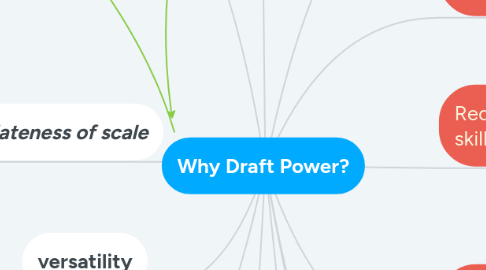
1. sustainability
1.1. diversity
1.1.1. against specialization by nature
1.1.2. having a team leads to "pastures, fenced fields, forage crops, feed grains, barns for stable room and feed storage," (WB, 2013) which leads to the ability to keep other types of animals.
1.1.2.1. BIODIVERSITY
1.1.3. "diversity of crops and animals, led in turn to the rotation of crops" and "the use of manure as fertilizer"
1.2. homegrown energy & fertility
1.2.1. the farm sponsors much of its own operating energy and fertility
1.2.1.1. ENERGY: Draft animals are solar powered! They run off feed grown on farm. Minimizes carbon footprint, and deliver clean, sustainable energy.
1.2.1.2. FERTILITY: draft animals manure nourished and fertilizes the soil. Their step are light and do not compact soil like the weight and tires of the tractor.
1.3. economic health on farm
1.3.1. cultivating a local economic community of local shops, trades and industries.
2. appropriateness of scale
2.1. draft power determines the scale of the farm; small, family sized farms
3. versatility
3.1. ability to help with delicate garden work to heavy plowing
3.2. able to do both forestry work and seasonal snow work
3.2.1. your draft animal always starts, tractors, not so much in the cold, especially
4. it's fun!
4.1. nourishment for the soul, being around and connected to animals, being connected to the land.
4.2. Being present breeds mindfulness. Being hypersensitive to the world around you,
4.3. "Sharing work and life with our equine [or bovine] partners is simultaneously grounding and uplifting" -David Fisher insert p. 14 in The New Horsepowered Farm
5. enriches/supports local economy
5.1. economic diversity
5.2. job creation
6. enriches community
6.1. sharing of knowledge, mentors
6.2. utilizing draft animals to educate, demonstrate; bring community together.
7. The "Tractor Package" (the antithesis of draft animal power)
7.1. HIGHLY CENTRALIZED LONG-DISTANCE ECONOMY
7.2. increased dependence on farm equipment corporations, oil companies
7.3. increased dependence on credit
7.4. increased dependence on toxic chemicals, e.g. pesticides, herbicides, chemical fertilizers, etc.
7.5. larger farms, fewer farmers
7.6. increased specialization=loss of diversity
7.7. more annual crops, less perennial crops
7.7.1. more erosion
